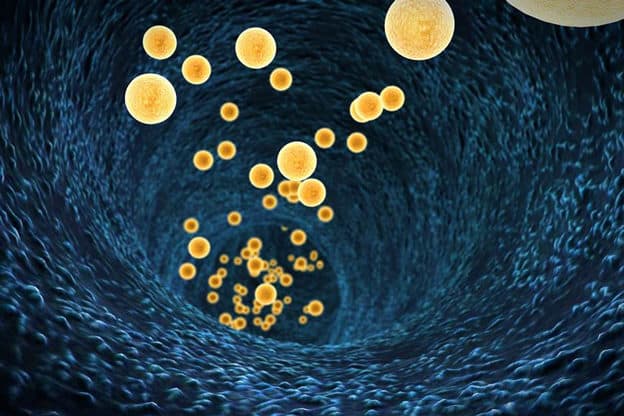When I say bile, you probably think of that awful digestive fluid. Maybe you know what it is and what it does, maybe you don’t. While it seems inconsequential, it is anything but.
Bile is fluid made by the liver and stored in the gallbladder that helps digestion and absorption of fats (and fat soluble vitamins) in the small intestine. That’s the well-known function (in the health community). It turns out, bile does a lot more than that. It is anti-microbial, gets rid of waste in the body, regulates cholesterol homeostasis, and has now been shown to play a role in glucose metabolism.(1,2,3,4) In fact, bile acids are now regarded as important hormones and are emerging as regulators of the gut microbiome.(5,6)
If you know me and my work at all, you know how important the gut microbiome is. Our microbiome is supposed to be primarily in the large intestine. When microbes live and grow in the small intestine a whole host of unpleasant symptoms and consequences arise. This is SIBO, small intestine bacterial overgrowth. So, bile kills microbes in the small intestine (and then the bile gets absorbed before entering the large intestine, leaving the large intestinal microbiome alone). They have done experiments in mice and rats: normal bile, no bacterial overgrowth. Without bile, the mouse gets SIBO. Adding bile acids (as a supplement) back and the SIBO goes away again! (7). In summary, reduced bile acids in the gut are associated with bacterial overgrowth and inflammation.(5) We also know that bile helps to maintain the integrity and health of the gut lining (8).
There is also a chicken and egg dilemma happening. The lack of bile could be causing the microbial overgrowth, but the microbial overgrowth (from another root cause) can break down bile, causing fatty stools.
All of this is discussed further in my eBook!
What affects bile acid production?
● Antibiotics
● Various disease states
Symptoms and conditions related to low bile:
● Fat maldigestion and malabsorption
● Deficiencies in fat soluble vitamins A,D,E,K
● Interference with absorption of Coenzyme Q10 and beta-carotene
● SIBO
● IBS
● Poor liver function/disease
● Gallbladder removal
Consuming adequate amounts of healthy fats will help to stimulate bile production. For the average adult consuming an estimated 2,000 calories a day that translates to 25-35% of calories from fat or 44-78 grams a day.(9) Of course, the amount and sources will vary by person and individual tolerance to certain foods so always listen to your body and eat was feels good for you. A diet rich in fruits and vegetables is also key to feeding your good bacteria and promoting bile production.
What can you do? How to stimulate bile acid secretion and support a healthy gut:
● Licorice root extract (10,11)
● Ensure healthy liver function
● Avoid foods that bad bacteria thrive on such as: refined foods and sugars and trans fats
● Consume probiotic foods that contain beneficial bacteria such as kefir/yogurt, greek olives, and other fermented foods
● Consume prebiotic foods that feed the good bacteria such as bananas, garlic, leafy greens and other foods high in fiber (a variety of fruits and vegetables)
How can we help? Nutrition therapy with a Registered Dietitian (who specializes in digestive disorders) is essential:
● Identify gut dysbiosis (microbial imbalance)
● Recommend supplements/enzymes to stimulate bile secretion and assist with fat absorption
● Recommend dietary strategies
References:
1. Bile. Wikipedia. 2017. Available at: https://en.wikipedia.org/wiki/Bile.
2. Bile. National Library of Medicine – PubMed Health. 2017. Available at: https://www.ncbi.nlm.nih.gov/pubmedhealth/PMHT0022186/.
3. Goel. SIBO and Liver Diseases. BeyondDisease.com. 2015. Available at: http://www.beyonddisease.com/sibo-and-liver-diseases#32.
4. Staels B, Fonseca VA. Bile Acids and Metabolic Regulation: Mechanisms and clinical responses to bile acid sequestration. Diabetes Care. 2009;32(Suppl 2):S237-S245. doi:10.2337/dc09-S355.
5. Distrutti E, Santucci L, Cipriani S et al. Bile acid activated receptors are targets for regulation of integrity of gastrointestinal mucosa. Journal of Gastroenterology. 2015;50(7):707-719. doi:10.1007/s00535-015-1041-8.
6. Houten SM, Watanabe M, Auwerx J. Endocrine functions of bile acids. The EMBO Journal. 2006;25(7):1419-1425. doi:10.1038/sj.emboj.7601049.
7. Lorenzo-Zúñiga V. Oral bile acids reduce bacterial overgrowth, bacterial translocation, and endotoxemia in cirrhotic rats. Hepatology. 2003;37(3):551-557. doi:10.1053/jhep.2003.50116.
8. Fabian T. The Importance of Bile Acids: Part One. Microbiome Mastery. 2016. Available at: https://microbiomemastery.com/importance-bile-acids/.
9. Appendix 7. Nutritional Goals for Age-Sex Groups Based on Dietary Reference Intakes and Dietary Guidelines Recommendations – 2015-2020 Dietary Guidelines – health.gov. Healthgov. 2017. Available at: https://health.gov/dietaryguidelines/2015/guidelines/appendix-7/. Accessed October 26, 2017.
10. Sokol R, Devereaux M, Dahl R, Gumpricht E. “Let There Be Bile”-Understanding Hepatic Injury in Cholestasis. Journal of Pediatric Gastroenterology and Nutrition. 2006;43(Supplement 1):S4-S9. doi:10.1097/01.mpg.0000226384.71859.16.
11. Gumpricht E, Dahl R, Devereaux M, Sokol R. Licorice Compounds Glycyrrhizin and 18β-Glycyrrhetinic Acid Are Potent Modulators of Bile Acid-induced Cytotoxicity in Rat Hepatocytes. Journal of Biological Chemistry. 2005;280(11):10556-10563. doi:10.1074/jbc.m411673200.
*This was a non-sponsored guest post by Crystal Longo Savoy


My gallbladder was removed about 5 years ago. I’m currently having digestive problems. Is there a supplement you would recommend for people who are lacking a gallbladder?
I like GB digestion by Pure encapsulations and/or Lipogen by Metagenics. They are both available on https://wellevate.me/dianne-rishikof/#/